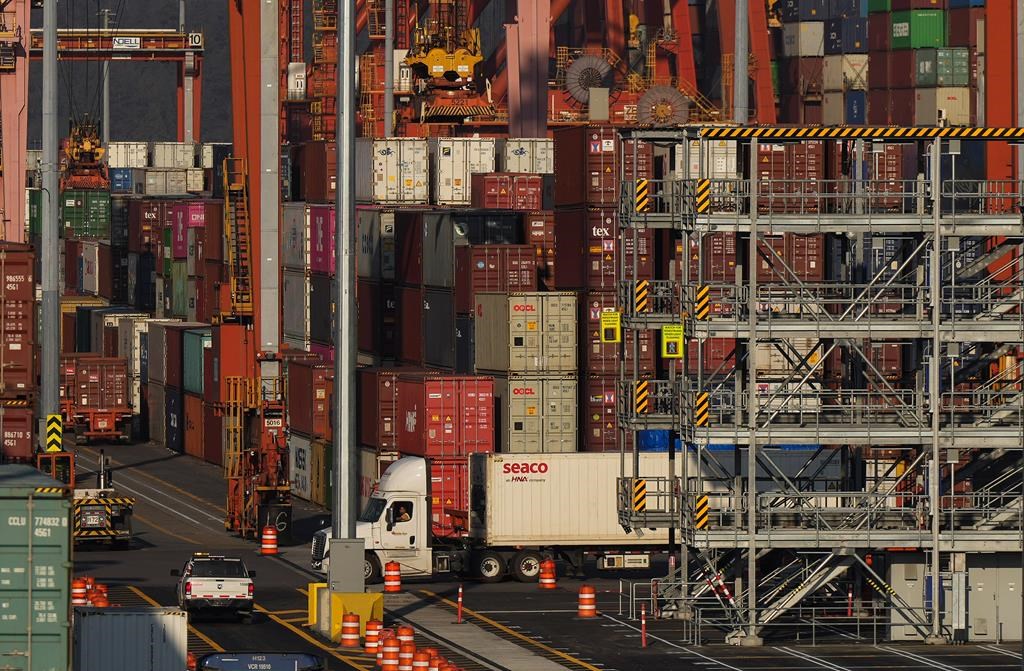B.C. port strike could have big impact on Canadian economy, expert warns

More than 7,000 port workers across British Columbia went on strike Saturday, and one expert says it could have a profound impact on the Canadian economy.
This comes after the British Columbia Maritime Employers Association (BCMEA) says federally mediated talks with the International Longshore and Warehouse Union Canada (ILWU) took place throughout the night — but no deal was reached and workers walked off the job July 1.
Matthew Holmes, senior vice-president of policy and government relations with the Canadian Chamber of Commerce, says the strike is “extremely concerning.”
Advertisement
“A quarter of our goods move through these ports on the West Coast and so this will touch every aspect of our economy. This will fuel inflation, this will increase costs for Canadian families and businesses, and it will inflict serious damage on the Canadian economy,” he told CityNews.
Holmes says around $800 million in goods move through B.C. ports per day, and if the strike spans a week, Canada could lose around $5.5 billion.
“That’s bigger than the annual amount the government wants to spend on the new Canadian dental care plan. It’s a significant number and we need to see the government take it seriously,” he said.
“The ports are under the federal authority so the federal government has quite a number of tools that [it] can use here. We really feel that they need to get them back to the table. We respect the rights of workers to bargain and negotiate, we want to see them do that in good faith with the employer group at the table… But we need to see the government not let this drag on at all, and we will be calling for more measures if it does.”
Related articles:
-
Thousands of B.C. port workers on strike
-
Possible B.C. port strike will spare cruise ships, employers say
-
B.C. premier ‘worried’ about potential port strike impacts
-
B.C. port cargo loaders approve strike, but talks continue with maritime employers
He anticipates the strike will impact not only products coming into B.C., but that it could have an overall impact on Canada and the country’s reputation.
Advertisement
“We’ve got lots of food products coming in, everything coming in from Asia. So cars, anything with electronics, but it’s also what we send out and what we ship to our trading partners — our resources, our food, our fuels, our fertilizers — products that we make here in Canada. It’s not only the day-to-day functioning of our economy, but it’s the goods we share with our trading partners, and it starts to paint Canada as an unreliable trading partner.”
The strike impacts about 7,400 terminal cargo loaders and 49 of the province’s waterfront employers at more than 30 ports, including Canada’s busiest port in Vancouver.
“A quarter of our goods move through these ports on the West Coast, and so this will touch every aspect of our economy. This will fuel inflation, this will increase costs for Canadian families and businesses, and it will inflict serious damage on the Canadian economy,” Holmes said.
In a tweet, Minister of Labour Seamus O’Regan says the two groups are “at the bargaining table working towards a deal.”
“Federal mediators continue to support the parties in their negotiations. We cannot emphasize this enough — the best deals for both parties are reached at the table,” it reads.
Advertisement
The BCMEA and ILWU remain at the bargaining table working towards a deal.
Federal mediators continue to support the parties in their negotiations.
We cannot emphasize this enough — the best deals for both parties are reached at the table.
— Seamus O’Regan Jr (@SeamusORegan) July 1, 2023
Advertisement
The union representing workers is pushing to prevent work erosion, protect workers from automation and inflation, and secure a fair cost of living.
CityNews has reached out to B.C.’s Ministry of Labour for comment.
With files from Cole Schisler
